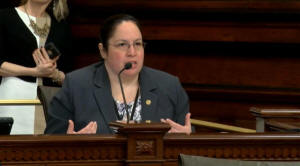|
In 2020, Illinois taxpayers began to subsidize the cost of
undocumented immigrant health care for those over the age of 65.
In 2022, the state budget included subsidizing coverage for
those over the age of 42.
As part of the state's fiscal year 2024 budget that began July
1, Gov. J.B. Pritzker modified the program to only cover those
over 65 for a total budgeted amount of $550 million. Questions
remain on how the state will afford it.
The plan was discussed by advocates from all over the state on
Tuesday, who shared their concerns about the feasibility of the
plan with the Illinois Department of Healthcare and Family
Services.
Nadeen Israel of the Aids Foundation said she understands the
financial barriers involved in the plan but hoped to work with
the Pritzker administration to fix any issues.
"Healthy Illinois recognizes the fiscal realities facing our
state and wants to work with the Pritzker administration, HFS
and all stakeholders to find solutions to efficiently use
taxpayer dollars to accomplish our shared goals of healthcare
coverage for all," Israel said.
With $550 million in the state's budget for immigrant health
care, state Sen. Cristina Castro, D-Elgin, said in July that the
state could run out of money for the program in only a few
months.
"Do you have something that is triggering that, that you are
foreseeing budgetary wise that you're like, 'we don't have
enough money,'" Castro said. "I mean, you're saying we don't
have money, but you say you will run out in November."
Other issues brought up during Tuesday's meeting included
concerns about co-pays Pritzker implemented and the risk of
charging non-citizens for health care when many don't have
income.
"Based on our experience working with hospitals, we do not feel
comfortable with this assumption. It is very likely that
patients will receive medical bills that they cannot afford,"
said Edith Avila Olea of the Illinois Coalition for Immigrant
and Refugee Rights. "We do have questions about what patients
will do when they are billed incorrectly."
State Rep. Kevin Schmidt, R-Millstadt, told The Center Square
that he does not support using taxpayer dollars for this
program.
"I don't think we should be spending money on immigrants who are
here illegally," Schmidt said.
Schmidt added that there are several issues that need the same
funding that should be addressed before migrant health care.
"Well, obviously, the big elephant in the room is that the state
should put a large portion of that down towards the pension
debts," Schmidt said. "If you're a business or just an
individual, you would want to knock down your debt first, then
move forward."

|
|




